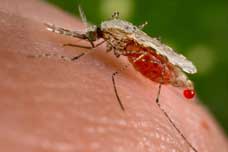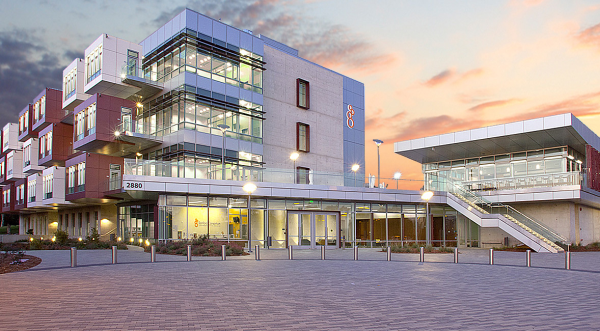University expansion is never uncomplicated, especially in an urban environment where density is high, real estate is ultra-expensive, and development is intensely regulated. Yet new buildings do go up in places like New York City if you have the drive, wealth, and reputation of an institution like Columbia University, which is currently constructing not only new buildings but an entirely new campus to expand its academic and research programs. In addition to the original Morningside Heights location and the Medical School campus in Washington Heights, Columbia has purchased and is building a new campus in the "Manhattanville" neighborhood, stretching from 125th Street to 133rd Street in West Harlem.
Tags: biomedical sciences, Northeast, Biomedical expansion, New research facilities, New York, Columbia University, 2012, Neuroscience, Columbia, BioResearch Product Faire Event, NY, new construction, NYC campus competition
Tags: CA, University of California San Diego, Stem cell research, New research facilities, new science wet labs, Southwest, California, 2012, San Diego, UCSD research, UCSD, Stem Cell, La Jolla, Biotechnology Vendor Showcase, new construction
Medical research building construction is underway at the University of Wisconsin-Madison with high hopes for top level research once the three stages of this project have all been completed. The goal for this project, which together will be called the Wisconsin Institutes for Medical Research (WIMR), "is to create a new kind of, almost revolutionary, model for how we do medical research," said Dr. Robert Golden, dean of the UW School of Medicine and Public Health.
Tags: Medical Research, cancer research, 2012, WI, Wisconsin, University of Wisconsin Madison, UW Madison, BioResearch Product Faire Event, Madison, construction
The University of Alabama at Birmingham has been awarded a $7 million research grant to continue its leadership in pioneering clinical trials in the treatment of neurofibromatosis 1 and 2 and schwannomatosis, all rare genetic diseases. According to the Birmingham Business Journal, the circumstances of these diseases lead to non-cancerous tumors forming on the nerves and potentially causing blindness, hearing loss, learning disabilities, pain or deformity.
Tags: 2012, Alabama, University of Alabama, University of Alabama Birmingham, BioResearch Product Faire Event, UAB, Birmingham, AL, research grant
Biomedical science researchers have worked tirelessly at the University of California, Riverside since the discovery of a crucial link involving mice, humans, and Alzheimer's disease. Back in 2006, UCR researchers, in a collaborative effort with the University of South Florida, discovered an interesting connection between the immune system and Alzheimer's disease while experimenting on lab mice. Professor Douglas Ethell, the assistant professor of Biomedical Sciences at UCR, along with the USF's own Professor Gary Arendash of the Johnnie B. Byrd Institute, was instrumental in this find.
Tags: CA, Bioscience research, biomedical sciences, biomedical research, Bioresearch, Southwest, 2012, Alzheimer' Research, BioResearch Product Faire Event, Research, Riverside, UC Riverside, UCR
New research at Texas Medical Center is underway at the newly opened Neurological Sleep Medicine Center in the Memorial Hermann Hospital. This progress is taking place amidst the tireless construction and restless activity of downtown Houston.
Tags: Bioresearch, Texas Medical Center, Texas, 2012, tmc, BioResearch Product Faire Event, Houston, TX, TMC New Research Facilities
In 1962, the Seattle World's Fair was held in the northwestern capital city. The legacy of that event goes well beyond the iconic Seattle Space Needle (right) and is explored in a panoply of summer and fall educational and entertainment festivities celebrating the 50th Anniversary. One of the "Next50" happenings is an interactive exhibit to highlight the role of Washington State's life science research innovations in addressing global health challenges. If space exploration was the governing dream of the near future in the 1960's, our generation's overriding fascination may be with possibilties inherent in life science research discoveries and their applications for transforming the health of millions of people worldwide in order to lead fuller, longer lives.
Tags: UW, University of Washington, Northwest, Lab-on-a-chip Technology, 2012, science event, Event, Front Line event, science current event, Seattle, bioscience event, Science research hub, scientist solutions, Exhibit space
How is it that a prominent Rockefeller University professor and director of the Laboratory of Neurogenetics and Behavior is sought out by a fashion magazine one month, the New York Magazine the next, and a CBS interview just last week? Dr. Leslie Vosshall studies the mechanism of scent recognition in humans on the one hand, and attraction to humans by mosquitos on the other. We still know so little about smell, and even less about why an insect like the mosquito hones in on one of us more often than another, but the Vosshall Lab is adding insight to the genetic basis of olfactory recognition. Given that mosquitos are a global vector for disease, including right here in the U.S., Vosshall's research aims to find out what it is about a particular one of us that excites the little bug to such raptures. If we know that, perhaps we can intervene productively to keep them at bay. As for the fashion magazine (Elle Canada), they wanted an expert on scent to comment on designers' and retailers' new fad for marketing their products with a scent component.
Tags: Rockefeller University, Northeast, women in science, New York, 2012, genetic engineering, Neuroscience, BioResearch Product Faire Event, NY, New York City
 It's summer in the Northern Hemisphere, and in most places that means mosquitos are out for our blood, which wouldn't be much to give up if it weren't for the itchy -- and in many parts of the world, deadly -- package that the tiny insect leaves behind. Plasmodium falciparum is the human malaria pathogen that kills over a million people annually around the world (largely infants, young children and pregnant women, most of them in Africa). One approach to combatting the spread of the disease is to genetically engineer a mosquito that cannot transmit the parasite and yet is able to reproduce with mosquitos that do, in order to infiltrate and alter the population overall to become one that is benign (except for the itching).
It's summer in the Northern Hemisphere, and in most places that means mosquitos are out for our blood, which wouldn't be much to give up if it weren't for the itchy -- and in many parts of the world, deadly -- package that the tiny insect leaves behind. Plasmodium falciparum is the human malaria pathogen that kills over a million people annually around the world (largely infants, young children and pregnant women, most of them in Africa). One approach to combatting the spread of the disease is to genetically engineer a mosquito that cannot transmit the parasite and yet is able to reproduce with mosquitos that do, in order to infiltrate and alter the population overall to become one that is benign (except for the itching).
Tags: CA, University of California Irvine, Southwest, California, 2012, genetic engineering, BioResearch Product Faire Event, Irvine, UCI

ARCHITECT'S RENDERING OF NEW PROTON BEAM THERAPY FACILITY IN ROCHESTER, MINN.(Courtesy of mayoclinic.org)
Tags: Minnesota, 2012, Rochester, Mayo Clinic, Cancer Treatment, Cancer, BioResearch Product Faire Event, MI, Proton, Treatment


